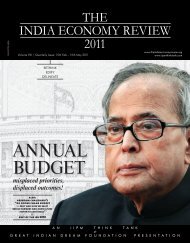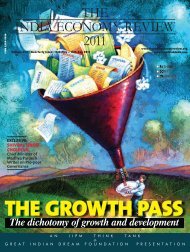Download - The India Economy Review
Download - The India Economy Review
Download - The India Economy Review
You also want an ePaper? Increase the reach of your titles
YUMPU automatically turns print PDFs into web optimized ePapers that Google loves.
straining rules and institutions we need<br />
suitable mechanics of checks and bal-<br />
ances, and of incentives and disincentives<br />
at the points where markets meet the<br />
institutions.<br />
To empower markets, we have to grap-<br />
ple with a range of forces on the supply<br />
and demand sides. I give some examples<br />
to provide an idea of the challenge.<br />
Primary agricultural producers — of<br />
cereals, pulses, oilseeds, vegetables,<br />
fi sh, poultry, meat etc — face disproportionately<br />
large buyers, do not have<br />
access to information of other markets,<br />
lack transport, storage and fi nance.<br />
<strong>The</strong>y are also harassed by local extortionists.<br />
Rent seeking at government offi ces and<br />
panchayats does not allow prices to<br />
refl ect anything close to the cost of<br />
production. Further, the problem is<br />
caught in a vicious cycle, because rent<br />
seeking can abate only when markets<br />
take over in a true sense. <strong>The</strong> circularity<br />
does not have an easy solution as<br />
supervision at decentralised level is<br />
enormously costly and corruptible.<br />
Many industries are subject to extortion<br />
along the entire supply chain from<br />
raw material to the customer. Arbitrary<br />
extortion at different stages of value<br />
addition leads to distortion of relative<br />
prices at these stages. Extortion is a law<br />
and order problem only on the surface.<br />
A nexus between extortion and politics<br />
is clear in most cases.<br />
Many markets are subject to avoidable<br />
transaction costs. Some of them are<br />
visible like multiple tax jurisdictions<br />
and multiple and in-kind subsidies. But<br />
there are many items that are not as<br />
visible, e.g. costs incurred at the stages<br />
of inspection, audit, certifi cation and<br />
clearances.<br />
In many cases markets are prevented<br />
from becoming contestable by carteltype<br />
accommodation or political favouritism.<br />
Obstruction by incumbent<br />
groups usually takes the form of collusion<br />
on input, labour and product pricing.<br />
Political favouritism occurs<br />
through manipulation of tender practices,<br />
bid rigging, deliberate delays,<br />
infl uencing buyers and so on. Legal<br />
action is not easy because of lack of<br />
verifi able evidence and, often, offi cial<br />
complicity.<br />
Subsidy on purchases is widespread.<br />
Some are provided on inputs, e.g. on<br />
power, diesel, petrol, loans etc for farm<br />
or industrial use. Others are plain consumption<br />
subsidy e.g. on travel, accommodation<br />
and other services for government<br />
and public sector employees<br />
and legislators. State governments<br />
provide many additional forms of consumption<br />
subsidies. Many are in kind<br />
and hence highly distortionary.<br />
T RANSFORMATIVE PLANNING<br />
Type and quality of consumer goods<br />
and services are dictated in many local<br />
markets by non-market forces through<br />
the guise of customs, culture and chauvinistic<br />
ideology.<br />
Producers are sometimes forced by<br />
local politicians and musclemen to differentiate<br />
between different parts of an<br />
otherwise undifferentiated market.<br />
Some parts of the markets get priority<br />
supply and servicing. In products where<br />
delivery or servicing takes time, it distorts<br />
the functioning of the market. A<br />
wide variety of markets face this sort of<br />
distortion.<br />
Apart from these, we have to grapple<br />
with organised illegal transactions that<br />
feed into other markets and undermine<br />
effi ciency and fairness. Many of the problems<br />
discussed here arise from unlawful<br />
behaviour. But we cannot eliminate them<br />
through the route of law enforcement<br />
alone because of political connection and<br />
corrupt enforcement machinery. To clean<br />
up, we have to develop economic incentives<br />
and employ technology and e-governance<br />
measures that could lock at least<br />
some illegitimate transactions.<br />
Externalities,<br />
Public Goods and Merit Goods<br />
Even as markets are strengthened, important<br />
markets will continue to fail because<br />
of externality. Secondly, markets are not<br />
able to supply the right amount of public<br />
goods. Third, they produce merit goods<br />
at prices unaffordable to many given today’s<br />
income profi le. But public production<br />
alone cannot settle these supply issues<br />
satisfactorily as it leads to poor<br />
quality, corruption, and indifferent or arrogant<br />
behaviour. Both private and public<br />
production have to be used in these areas<br />
in an astute mix, and a variety of issues<br />
THE INDIA ECONOMY REVIEW<br />
55





